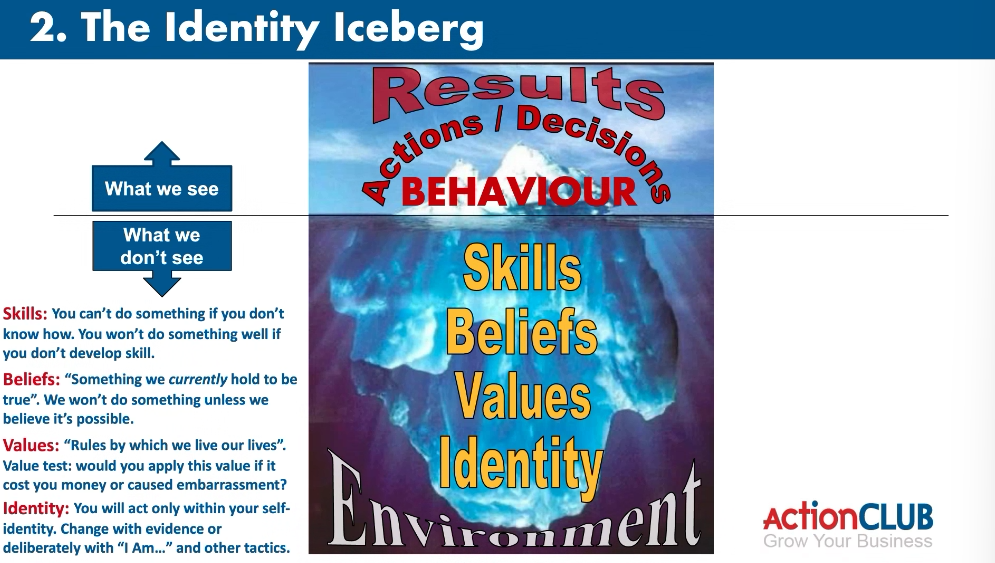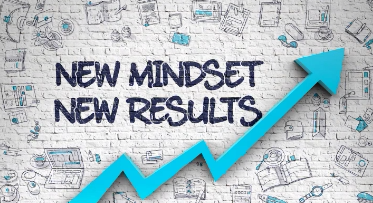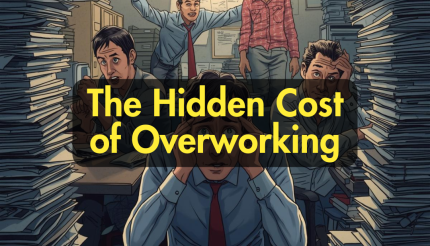Your Mindset – your personal development
In today’s ActionCLUB, we talked about 4 Mindset Principles that determine your own development personally, and how that impacts on your business. It wasn’t quite like the regular sessions we have, but it was powerful and uplifting, and I took great pride in the answers that some of the group gave. Here is a brief overview of what we talked about.
Principle 1- “Be, Do, Have”
What do you want to have in your life, and in your business? Money? Travel? Happiness? Family? Once you know this, you can start working towards your goals. What needs to happen then becomes reverse planning – think next about what you need to DO to achieve that, and who will you need to BE so that you could and would DO what you need to. This is the start of the law of attraction: that to be able to attract what you want, you need to be attractive. Positive intentions without positive actions achieves positively … nothing.
Most people don’t have a problem with doing – people do an awful lot. Many people know roughly what it is that they want to have, but often not specifically enough. So the equation goes: Be x Do = Have. You need to be the right person who does the right actions in order to have that which you are aiming for.
Do you have a set number for the amount that you would like to be earning in 5 years’ time? If not, why not? If you don’t write it down, then how can you start planning to get there? Pause now, and decide what money you would like to earn in 5 years’ time, and all of a sudden that number because real… it crystalises and you have something to aim towards.
What characteristics do you need to BE to be a good business owner? Think about this yourself for a moment, write down the first 3 things that come to mind. Here are some of the answers we pulled up in today’s ActionCLUB:
- Resilient
- Driven
- Empathetic
- Attention to detail
- Focused
- Engaged
- Positive
- Inspirational
- A leader
- A delegator
- Decision-maker
- Ability to sell
- A teacher
Do you feel you, as a business owner, have all of these characteristics? For example, the ability to sell: do we all have all the skills that we need to sell? This tends to be the number one most common missing skill for business owners early on, because most people have some sort of skill that they can sell – be it electricians, cleaners, fitness instructors, carpenters… but we are never taught how to sell. Which of the list above do you think you need to develop and grow in to be able to BE the business owner you need to be? Write them down! You might even find that some of the “Be” that you need to get what you have comes from outside of yourself: if you are lacking in the area of negotiation, why not build your network and your team to fill that gap and take on all your negotiation?
All of this is based on your beliefs… things you hold to be true. You need to challenge yourself and believe that you can change your characteristics? You have to believe that you can change any aspect of yourself. This is the real source of power. If you believe that you can, then you can identify what you need to change. One of the team today had undertaken a DISC profile 20 years ago when embarking on a sales job, and recently did a DISC profile as part of our course and found that it had all changed dramatically.
Principle 2 – The Identity Iceberg

We see people’s actions, decisions and behaviour, but this is only 10% of the picture. We don’t see the 90% behind the reasoning, beliefs and thinking that shapes all of their behaviours.
The first thing that affects someone’s behaviour is their skills. You can’t do something if you don’t know how… You won’t do something well if you don’t develop the skill. For example, can you cook? Do you love entertaining? I really am not skilled at all in the kitchen – even only 5 years ago I had to look up the method for scrambled eggs on YouTube. My family mocked me for weeks! Actually though, it came from a place of me wanting to do the best I could.
The biggest contributing factor to your skills is your beliefs: this is defined as, “Something we currently hold to be true.” We won’t do something unless we believe it’s possible. If you want to turn on a tap, which way would you turn it? Everyone has learnt the “righty-tighty, lefty-loosy”! However, if you look at the pedals on a bike, some of them do actually need to be turned clockwise instead of anti-clockwise. Your belief that ALL screws need to turn clockwise to tighten up could hold you there trying to fix this bike for hours. I failed to get into the choir at school when I was 8 – the teacher told me I couldn’t do it! So, following that I stopped singing, and now of course… I’m totally tone deaf! Andi grew up in Wales and was told repeatedly, sheerly on the account that he was born Welsh, that he could sing… therefore he sang a lot all through his childhood, and is now an amazing singer! What we believe determines what skills we feel we can commit to improving.
The biggest single contributor to your beliefs is your values. “Rules by which we live our lives”. The ultimate value test is: Would you apply this value if it cost you money OR caused embarrassment? We all claim to be honest – but would we own up to something in front of a room full of our peers? Your values determine your beliefs, which impact on the skills you have committed to develop, and this all demonstrates itself in the visible 10% of what others see you do.
This is all underpinned by your identity. You will only act within your self-identity. Change with evidence or deliberately with “I Am…” and other tactics.
There is one more thing in the water: and this is your environment. A victim will let the things around them push them around. A victor shapes their environment by putting themselves in the right place: surrounding yourself with the right people, have the right conversations, and ensure that nothing around you brings you down.
Notice that the “Be, Do, Have” principle can apply here: The results at the top are what you have, your actions, decisions and behaviour (and to some extent, skills) are what you do, and then everything below the water is your BEING – who you are. Some of the guys we get round to our place here in Budleigh LOVE coming here… not so much because they love working on our house especially, nor that Budleigh is particularly better than any other place, but ultimately because we are half a mile away from MacDonalds!
One member of our group today shared that when they were in a previous job, he had been labelled, put into a box, and was totally limited in terms of his potential and what he could achieve. He made the right call, left the job, therefore changing his environment, and now he is achieving everything he dreamed. Before the move, the identity that was being put upon him was not the identity he had for himself.
What do you need to change? Is your environment good for you? Which of your beliefs do you need to begin challenging and realigning? By only trying to change your actions and behaviour, you won’t achieve long term change… you have to work on all the things below the water.

Principle 3: Mindset Change – IVVM
This would be a good point to pause reading and watch this video by James Vincent about the IVVM process. You can re-program your mind to BE who you need to be with these 4 steps:
- Idealise – think about why you want it.
- Visualise – how does it look in images? Use a vision board, or even Pinterest, to gather together the images of things that you normally only imagine in your head.
- Verbalise – talk about it to yourself and others.
- Materialise – touch and feel something real.
Your brain does not know the difference between fiction and reality: if you dream of what you want, visualise it, talk about it, and make it real to yourself.
Principle 4 – Thinking Time
Set aside specific time to think and reflect. “The Road Less Stupid”. How many business owners put time aside to think? Most don’t, because we are too good at the doing!
Find a time each week, sitting somewhere different which is completely free from distractions. Take a notebook and pen, think in advance of one or more really great questions to ask yourself. Think about it, and write your answers… even if they evolve or change over time and when you are in that thinking space.
What great questions could you ask yourself?
- What is my mind focused on most of the time right now?
- How am I spending my time?
- Am I prioritising the most important things to me at the moment?
- Are my loved ones around me happy, and what can I do about it?
- What do I want future me to say about this phase in my life?
- What would me grandmother say about …?
- How do I want my children to remember me and talk about me?
And when thinking about your business, why not ask, “How could I get a new client every week?”
If you want to improve your quality of life, you need to improve the quality of your:
- Mentor / Teacher,
- Knowledge and education,
- Beliefs and dreams,
- Questions,
- Decisions,
- Actions.
As a coach, I want to help you build your belief in yourself. If you don’t have much self-belief, that’s fine because you can borrow some of my belief in you. For a totally obligation-free conversation totally free of charge… whether it be about you, your mindset, your business, your goals and dreams, please do get in touch with myself or Andi (andidavies@actioncoach.co.uk) and we can put aside some time to talk. You’d be crazy not to take up the chance, right?





